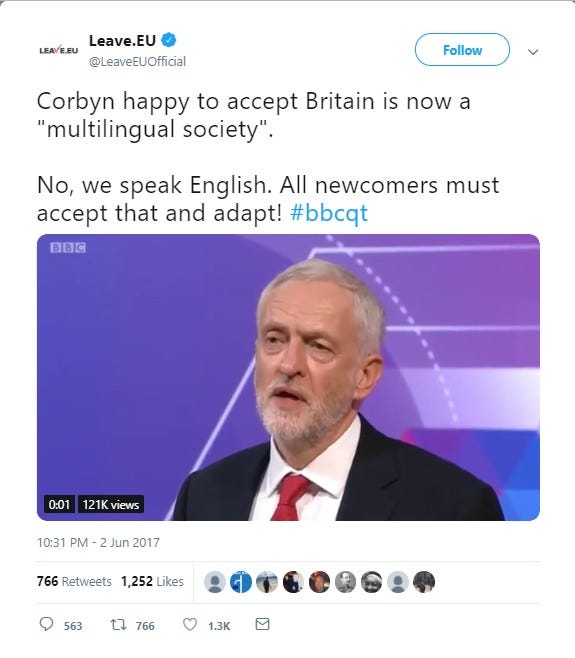Multilingualism is the norm for most of the world, and yet Britain falls so far behind in both tolerance of this and in reluctance to learn other languages.
The Schools Minister Nick Gibb has set a new target of getting 75% of all pupils studying and taking a foreign language GCSE by 2022. From the coming September all secondary school students will be expected to study a foreign language GCSE and take the exam. Gibb, in an exclusive interview with The Sun, explained that in a post-Brexit Britain it will be important for British people to acquire a second language because it will help “raise our profile in global markets” and “help our businesses to export our products, services and ideas.”
Since the dawn of this century, there has been a considerable decline in the number of pupils studying a foreign language for a GCSE with foreign language learning and a number of schools dropping foreign languages from their GCSE options. In Wales GCSE entries fell by 29% in the last five years. In Northern Ireland there has been a 40% fall in foreign language entries.
News of this has prompted politicians, business leaders, economists, headteachers and professional bodies to speak out and have their say on how worrying it is that Britain is behind on language learning compared to its European siblings. The All-Party Parliamentary Group on Modern Languages in their report in March called for a “National Recovery Programme” to address the “national crisis” in foreign language learning. Some of their proposals include making sure all children aged five to 18 learn a language, encouraging business to invest in language and cultural skills in the workforce to boost GDP and export growth, and calling for the government to rectify the absence of language skills in the Export and Industrial strategies.
No doubt some will support the ‘National Recovery Programme’ and Gibb’s proposal of making foreign language GCSE compulsory. However, there has been almost no new insight on the ‘language deficit’ and what can really be done to reverse it.
It almost goes without saying that Britain is a multicultural society, yet it is often not stated, and may come as a surprise to some that Britain is also a multilingual society. The official twitter account of Leave.EU infamously criticised Jeremy Corbyn for saying on Question Time that he accepted that Britain is a multilingual society.

While English is the common language and has been for centuries, minority languages have existed in Britain such as indigenous languages like Welsh, Gaeilge and Cornish, which too have existed for centuries. In more recent times, Britain’s linguistic ecology has been enriched by various waves of immigration from other parts of the world such as South Asia, Africa, The Middle East and Eastern Europe.
Yet, why is it that as Britain has become more cosmopolitan and culturally diverse that it is resolutely monolingual and has the unenviable distinction of being the worst country in Europe for foreign language learning?
One reason is language learning is very inflected by class. It is seen as something only the ‘elite’ few can excel at, as a marker of their special intelligence, rather than a perfectly normal and useful ability that everyone can acquire, like learning to cook or riding a bike. Also the types of languages that are valorised as ‘useful’ and ‘important’ are to some extent inflected by race and culturalism. So if a posh white British person speaks French or German then they are praised for their cosmopolitan sophistication, but if, for instance, someone from an immigrant background speaks fluent Punjabi or Polish (or in my case Esan) as their ‘community language’ or ‘home language’ then it is seen as a handicap and a stumbling block to ‘integration’ (for some really meaning assimilation).
Another reason is linguistic privilege. As a result of the legacy of the British empire and America’s global superpower status, English is arguably the world’s lingua franca. It is the dominant language of business, diplomacy, science, book publishing and much of popular culture. English is arguably the world’s most spoken language. As a result native English speakers in Britain don’t feel the need to learn another language, because it isn’t seen as a necessity as there isn’t an immediate material reward coming out at the other end.
Some argue that another reason is that the Brexit referendum has legitimised xenophobia and isolationism to such a degree that it has lead to ‘linguaphobia’, manifesting itself in cases of people being attacked or enduring abuse in public spaces due to speaking a foreign language. While one shouldn’t be reductive about Brexit, it is the case that there is an undercurrent in the Brexit phenomenon that is xenophobic and nativist; that is nationalist and territorialist; that champions insularity and parochialism; that believes in a mythical notion of a homogenous, monocultural, monolingual (and to some extent racially coded) Britain.
However, linguaphobia existed and has been legitimised in political discourse long before the Brexit referendum. Nigel Farage in 2014 talked about his ‘awkwardness’ when he claimed thathe could hear no English being spoken while travelling on a train from London to Kent. He later claimed that year that there were “entire areas in our cities where nobody speaks English.” This obviously reflecting a certain nationalist anxiety that ‘Britain is no longer British’ due to ‘mass’ immigration and multiculturalism.
In December 2012, the then Secretary of State for Communities and Local Government, Eric Pickles, in his 50 ways to save: examples of sensible savings in local government‘ called on local authorities to stop translating documents into other languages because translation “undermined community cohesion and encouraged segregation“.
David Cameron in 2016 similarly talked about multilingualism as a threat to Britain. He claimed that there is a correlation between the level of English spoken by Muslim women in the UK was linked to their degree of “resilience against the messages of Daesh“. This is clearly absurd on its face, especially as most ISIS recruits from Britain are British born and bred, speak English as their first language and have very distinctive British accents.
Such sentiments aren’t exclusive to the right. The New Labour government also participated in this moral panic over multilingualism. In response to the 2001 census that revealed 30 percent of Asian families did not use English as their main language at home, the then Home secretary David Blunkett in an essay titled Reclaiming Britishness decried this and demanded that immigrant families speak English at home because it would allow them to participate in British society and and help them to “overcome the schizophrenia which bedevils generational relationships”.
The biggest fallacy in all these statements is it conflates a ‘national unity’ with absolute linguistic uniformity. Research clearly shows that in the short term new migrants need facilities for learning English and that such provisions does accelerate social inclusion and proficiency in English progresses through each migrant generation. What is outrageous to nativists and reactionary nationalists is not migrants — or children of migrants — not learning English, but that them learning English doesn’t lead to them assimilating into Anglophone monolingualism and they retain the right to speak their ‘home language’ and maintain a functional bilingualism or multilingualism, where like in other parts of the world such as plurilingual Africa and South Asia, people use different languages according to the social context they find themselves in. I do not think it is a complete coincidence that the decline and contraction in foreign language education happened roughly around the same time as this ideological monolingualism was deployed by previous governments as part of the ‘British values’ agenda which would promote ‘integration and cohesion’ against the excesses of multiculturalism and mass immigration.
However, the broader problem, in my view, is not that policymakers devalue language learning per se, but they value it for the wrong reason. They have a very functionalist view of language learning by reducing it to a ‘skill’ that future workers will need to acquire in order to ‘compete’ and meet the demands of the increasingly fluid and “culturally agile” modern, globalised capitalist market. Even when we do teach languages in schools it is often in its most basic and rudimentary form; almost replicating the sort of thing you get in a ‘get by’ phrase book intended for tourists. There is mostly very little engagement with the literature, poetry and cinema of the language that allows one to fully understand the nuances, expressions, cultural references and ideas of another language that aren’t easily translatable to English.
This drab functionalist view of languages is unlikely to inspire young people to take up another language as they will see it as mechanical, boring and ultimately a mentally exhausting chore. The notion that speaking German will guarantee them a better job is unlikely to convince them. After all, with English as the world’s most spoken languages, what material incentive do young Britons have to learn another language that being monolingually English doesn’t already give them?
The argument for language learning should be that it enhances one’s understanding of one’s own culture and opens the door to other cultures. It broadens your horizons, expands your knowledge, facilitates individual enlightenement and helps you appreciate cultural achievements that have spread beyond national boundaries and are part of universal human culture. Arguments that focus on the ‘practical’ and economistic function of language lose sight of what is truly meaningful and beautiful about acquiring another language: its ability to break down barriers between peoples and countries and promote a sense of universalism and humanism.
There is no quick fix or simple solution. However, Britain’s ‘language deficit’ will never be reduced unless we revolutionise our language education system. We can begin this by expanding the range of languages on offer in schools, colleges and universities, so instead of just focusing on Western European languages like French and German, the option should be more open to world languages like Japanese, Chinese, Portuguese, Arabic, Hindi, Russian, Swahili, Amharic and so on. In addition, there needs to be substantial long term investment into language teaching, as well as creating a wider culture in our society that normalises multilingualism. It will take time, patience and cultural evolution, but this will go some way into create a truly world class language education for Britain’s young people.
Speaking English should not preclude one from learning and speaking another language, whatever it may be. Multilingualism has been the norm throughout human history, not as our present day prejudices may presume monolingualism. It shouldn’t be seen as a threat to ‘national cohesion’ or a burden on our resources, but as a valuable cultural achievement that benefits society and can be acquired by all. Until the positive educational and cultural case for language learning and multilingualism is put forward and economistic and functional defences are put to the side then foreign language learning in British schools will decline even further and Britain will remain the sick man of Europe for multilingualism.







